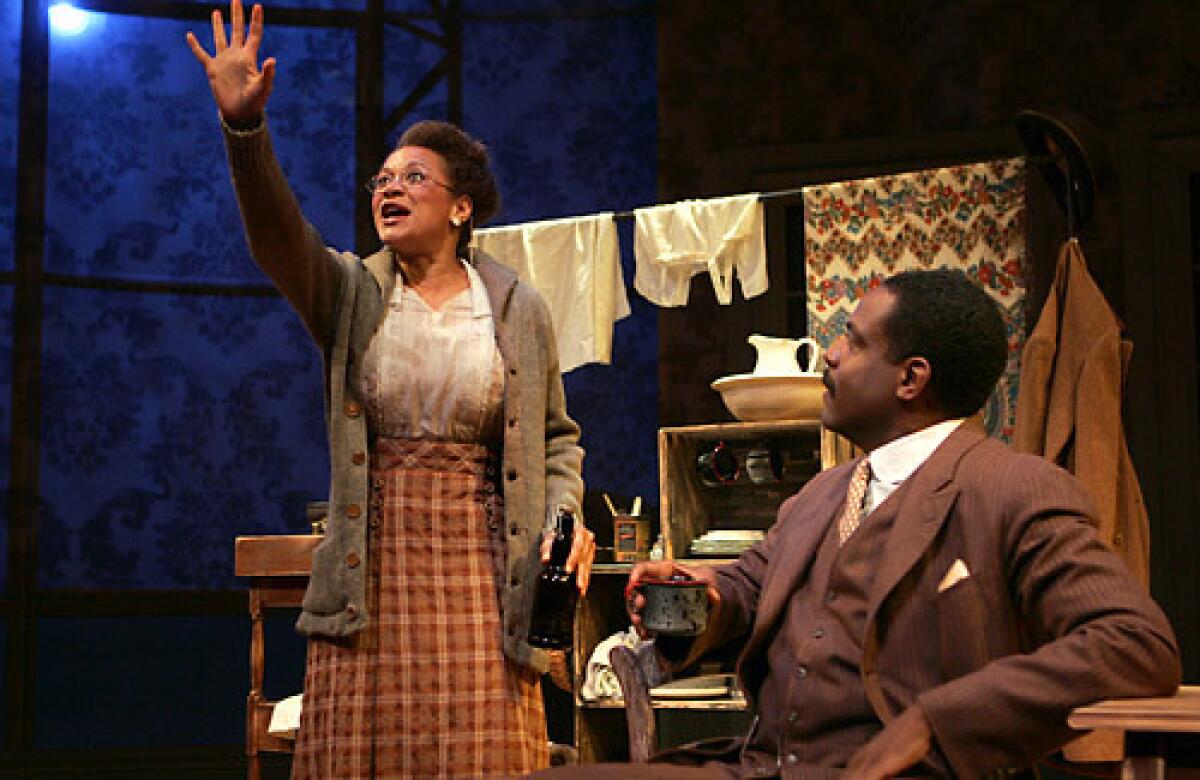‘Of Equal Measure’ at the Kirk Douglas Theatre

- Share via
The trouble with historical fiction is that there often isn’t a satisfying amount of either element. Fact constrains fantasy as the helpless past gets reduced to a pencil sketch.
“Of Equal Measure,” Tanya Barfield’s drama about the hypocrisy of Woodrow Wilson’s White House as experienced by an African American secretary, lays out an ambitious agenda of ethical, political and racial issues. It also raises (by quaint analogy) the question that has every political pundit’s tongue wagging at the moment -- how much compromise of core ideals is acceptable in the march to the Oval Office.
But the play, which had its world premiere Friday at the Kirk Douglas Theatre in Culver City, amounts to a set of compelling ideas in need of dramatic shaping. The characters are often fuzzy, the storytelling lacks drive, and there are just too many wrinkles in a badly organized plot. Barfield has thought deeply about her material, but she keeps imposing her insights onto her narrative rather than allowing them to emerge freely. It’s as though she has interpreted her world before constructing it.
The fictional character of Jade Kingston (Michole Briana White) is a stenographer on a mission. She lives with her brother, Eugene (Christopher O’neal Warren), in a dilapidated apartment that has neither running water nor electricity. This hardworking woman is determined to obtain these basic conveniences -- as well as an affordable chandelier or two when the budget will allow -- by making herself indispensable to her employer.
Edward Christianson (Michael T. Weiss), Wilson’s backroom advisor, offers Jade a promotion. He claims it’s for her diligence, but he has more nefarious motives. He’s in the process of segregating the White House -- a “reorganization” that includes different bathrooms for blacks and whites. It’s a policy that Joseph Tumulty (JD Cullum), the president’s chief of staff (whose influence is waning), sees as a betrayal of the campaign, which won a large share of the African American vote.
Christianson knows that Jade will provide an excellent cover for his controversial policies, and being an oddly romantic lech, he will try to take utmost advantage of her personally and professionally. In more ways than one, she’ll be forced to accept what turns her stomach.
Barfield doesn’t follow the whitewashed version of President Wilson (a boldly eccentric Lawrence Pressman) most of us were treated to in high school. This is not the eloquent egghead who gloriously championed the League of Nations but a sinister Machiavelli who adopts a ninny’s facade to conceal his role in his administration’s duplicity.
Wilson, who enjoys screening D.W. Griffith’s racially abusive “The Birth of a Nation,” sees only what is politically advantageous for him to see. He offers a sly wink at the propaganda machine sounding the drumbeat for war and feigns blissful ignorance of the detention and torture of his enemies, overseen by a diabolical figure named Mr. Plank (T. Ryder Smith). (Parallels between Wilson’s White House and the current one are pointedly suggested throughout.)
“Of Equal Measure” includes a broad selection of the domestic and foreign crises that marked Wilson’s presidency.
Under the threat posed by secret dealings between an increasingly belligerent Germany and an angry, unstable Mexico, America’s homeland defense grows paranoid. How this affects racial policy is fascinating, but Barfield doesn’t present her findings with lucid economy. In fact, it sometimes seems as though she hasn’t digested the historical sources informing her unwieldy tale.
In playwriting, what’s left out can be just as important as what’s included. Yet Barfield is all too willing to pile private melodrama on top of public turmoil.
Jade’s motivations for staying in a job that has become an affront to her conscience are complicated to the point of incoherence. Yes, we see that her story is paradigmatic of an ethical dilemma faced by many African Americans who have ventured close to the country’s ultimate seat of power -- in short, how does one negotiate between personal progress and the progress of one’s oppressed community? But the clutter surrounding this conflict blunts the impact.
The production, directed by Leigh Silverman, features some sharp acting. Especially memorable are the trio of men who are jockeying for White House power. Weiss plays up the more seductive aspects of Christianson’s villainy; Cullum lends fire (and an Irish brogue) to Tumulty’s moral disgust; and Smith is just plain frightening as Mr. Plank, who casts a menacing shadow on America’s noble idea of itself.
As Jade, White may be too dourly mature, but she captures the character’s unyielding sense of dignity. Her portrayal can’t sort out the twists of Barfield’s plot (no one’s could), but we remain sympathetic to Jade’s plight, excusing questionable decisions while we wait to see what else will be plunked down on her plate.
Yet it’s a strange experience to be in solidarity with a playwright’s vision while scratching one’s head at how it’s dramatized.
More to Read
The biggest entertainment stories
Get our big stories about Hollywood, film, television, music, arts, culture and more right in your inbox as soon as they publish.
You may occasionally receive promotional content from the Los Angeles Times.











